10 Philly Startups to Watch in 2018
From a team that wants to be your new internet provider to another that's tackling mental illness with tech, these promising young companies are working on big solutions.

Philly Startups to Watch in 2018. Photos by Claudia Gavin.
The startup state of mind is alive and well in Philadelphia, and we’ve got ten young companies to prove it. We put a call out to Philly’s innovation community to get a pulse on the startups we’re most excited about for 2018. The city answered the call with much momentum — we received more than 150 nominations. These startups have each identified a problem and are diligently working to advance their solutions. Presented in alphabetical order, here’s who we have our eyes on. (Plus, get a behind-the-scenes look at the startups here.)
Amino Payments
“This has really felt like being shot out of a cannon. We’re doing it all in Philadelphia.” –Will Luttrell, Amino Payments co-founder and CEO
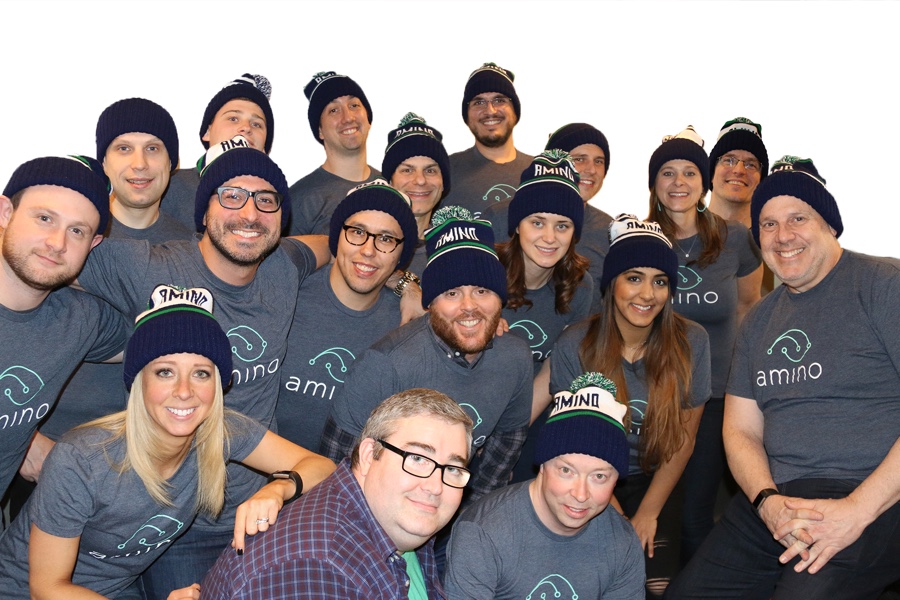
Amino Payments. Clockwise L to R: Jesse Bookspan, Akim Akimov, Colby Cox, Daniel Wharton, Tom Javian, Joe Morais, Peter Georgantas, Melissa Grimm, Jeremy Stanton, David Bookspan, Will Luttrell, Chris Chapman, Lindy Smith, Rob Falcone, Anthony So, Alec Greenberg, Taryn Cahill, Nikki Khanna. Photo courtesy of Amino Payments.
Founded: 2017
Team: 22
Funding: $1.85 million raised
Problem: Online advertising’s messy supply chain is riddled with fraud and abuse. The process’ lack of transparency leads companies to waste billions of dollars in digital ad sales.
Amino’s Solution: The company has created a blockchain payments system to track money and enforce the payment terms of online advertising transactions. Amino now tracks millions of ads per second.
Lesson Learned: The company’s early users said they wanted more than dummy reports about where their online ad dollars were going. So Amino now offers consultative services to help clients understand how they can optimize their online ad spending.
Fun fact: Amino recruited a college student (he finished his freshman year at Penn) who took a leave of absence to work at the startup.
What’s ahead in 2018: Amino plans to expand to a team of 40 in the next six months, with a focus on filling out its sales force. The company will announce a new partnership with the marketing team of a blue chip software company for their first adtech distributed blockchain system.
Keriton
“We’re not disruptive. We’re transformational. If we disrupt, nurses will lose and babies will be harmed. We’re facilitators to a process that’s currently manual and laborious.” -Vidur Bhatnager, Keriton founder and CEO
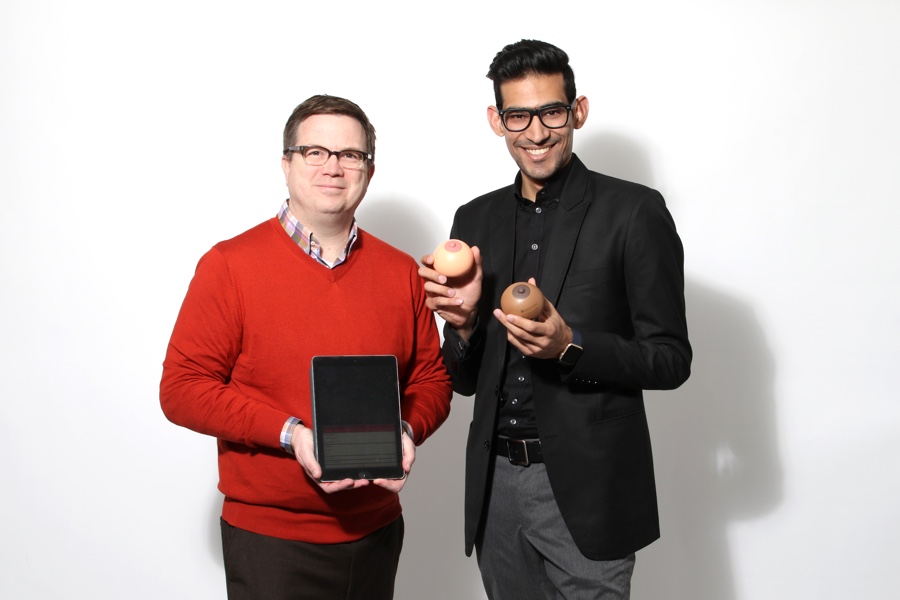
Keriton. Photo by Claudia Gavin.
Founded: 2016 by Vidur Bhatnager
Team: 9
Funding: $1.1 million raised
Problem: In the U.S. alone, about 500,000 ill and premature newborns are admitted to neonatal intensive care units (NICUs) each year. The infants rely on their mother’s breast milk for nutrition, but inefficient milk management systems could mean that babies receive the wrong quantity of milk, expired milk or even milk from a mother who’s not their own. Though the nurses spend a shocking 13,000 hours a year on breast milk management (internally referred to as bartending), hospitals struggle to handle inventory.
Keriton’s Solution: The startup has built Keriton Kare, a NICU feeding platform that simplifies the milk management process for clinicians and moms. It’s currently in use at the Hospital of the University of Pennsylvania and includes two apps that provide inventory data and real-time lactation analytics. Moms can use the platform to communicate with clinicians via messaging, video chat and media exchanges. The platform can lead to shorter hospital stays, lower readmissions, and fewer deaths by morbidities like Sepsis and NEC.
Hustle: Bhatnager started the company within a few weeks of attending a Penn hackathon where nurses explained their NICU hardships.
What’s ahead in 2018: Keriton is in talks with more than 60 U.S. hospitals and hopes to be in at least 50 percent of them by the end of the year.
LeagueSide
“It’s rare you find yourself in the unique position to build a billion dollar company. This is a massive opportunity. The bigger we get, the larger impact we make on communities.”
-Evan Brandoff, LeagueSide co-founder and CEO

LeagueSide. Photo by Claudia Gavin.
Founded: 2015 by Evan Brandoff and Zubin Teherani
Team: 15
Funding: $2 million raised
Problem: Youth sports are getting more expensive but leagues aren’t equipped to adequately advertise their needs. At the same time, potential sponsors have a hard time discovering sponsorship opportunities with the country’s 200,000 youth sports leagues. The disconnect leaves leagues unfunded (think: no equipment and tattered jerseys) and corporations continue to miss a golden marketing opportunity and big chance to support local communities.
LeagueSide’s Solution: The startup launched a bustling online sports league marketplace where teams can realize and advertise their sponsorship opportunities. Potential donors can then shop the marketplace by determining the leagues they’d like to support. The platform has funneled millions of dollars to over 600 leagues across 16 states.
Loyalty: About 95 percent of leagues working with LeagueSide want to stay with LeagueSide. Big-name sponsors using the platform include Uber, Verizon and Boston Children’s Hospital.
What’s ahead in 2018: While the startup has plans to bring in hundreds of new leagues and sponsors, they plan to also upgrade upgrade its tech platform to completely automate the sponsorship process from end to end.
NeuroFlow
“Emotional states don’t have to be subjective.”
–Chris Molaro, NeuroFlow co-founder and CEO
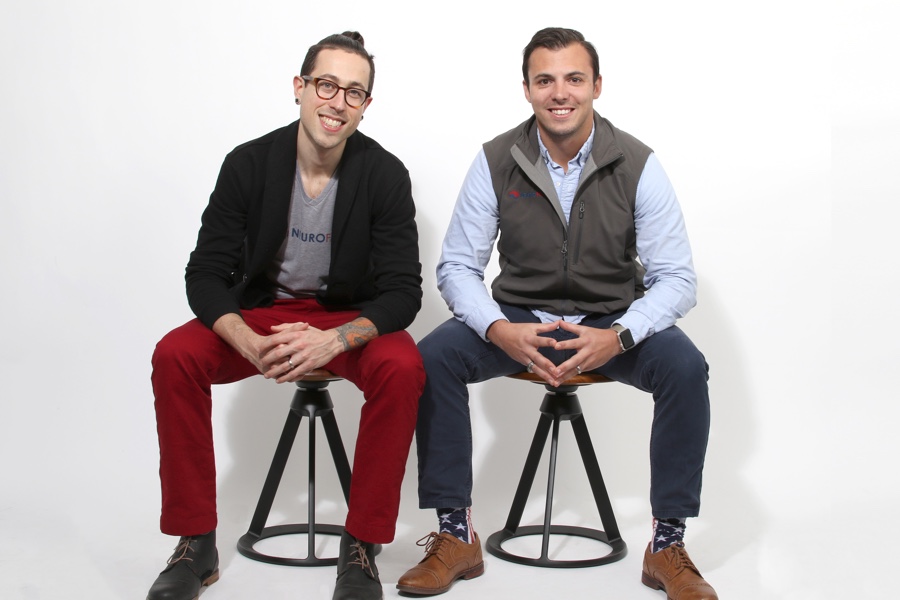
NeuroFlow. L to R: co-founder Adam Pardes, COO; Chris Molaro, CEO, co-founder. Photo by Claudia Gavin.
Founded: 2016 by Chris Molaro and Adam Pardes
Team: 15
Funding: $1.25 million raised
Problem: Though 52 million Americans struggle with anxiety-related disorders, many don’t get the treatment they need. Doctors lack tools that effectively and objectively measure mental health. Right now, the field largely relies on flawed self-reporting measures. Meanwhile, one out of five mental health patients quits treatment prematurely as a result.
NeuroFlow’s solution: The startup has developed data analytics software that aggregates heart rate, brain activity and a few self-report measures to quantify, in real time, how relaxed or stressed a patient is. The software is objective and gives doctors a better understanding of a patient’s triggers. Patients are more likely to stay engaged and motivated when using the “scorecard” since they can track their progress over time on the software’s dashboard.
Roadblock: The health care industry is rightfully slow to accept new tech, the team says. As they build more clinical outcomes data, they’re relying on those early champions who are willing to work with them now.
It’s personal: Cofounder Chris Molaro, a military veteran, Army officer and Bronze star recipient, has lost close comrades due to untreated mental illnesses like PTSD.
What’s ahead in 2018: As the startup continues beta testing, it has its sights set on expanding its user base.
Onyx Valley
“As I started my professional career, I didn’t see a lot of people who look like me. I wanted to do something about it.” -Kyree Holmes, Onyx Valley founder and CEO
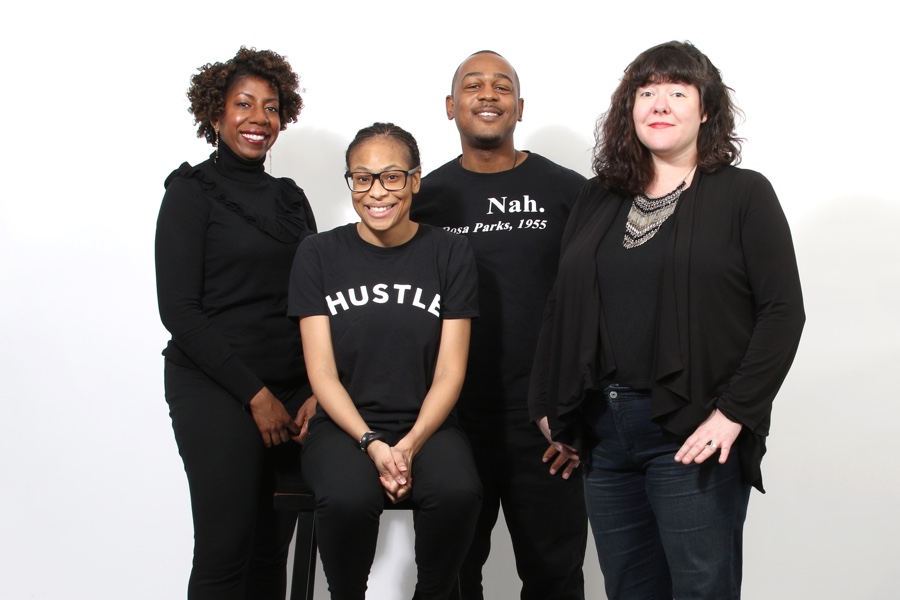
Onyx Valley. L to R: Denine Guy; Kyree Holmes; Chenard Cherilus; and Lindsay Grow. Photo by Claudia Gavin.
Founded: 2017 by Kyree Holmes
Team: 12
Funding: $30K in grants from StartupPHL and the Institute of Hip Hop Entrepreneurship
Problem: #TechSoWhiteandMale #NuffSaid
Onyx Valley’s Solution: The startup is organizing an intensive tech education and training program for students of color in the Philadelphia region. Through the program, the group plans to connect industry professionals with students who are often overlooked for tech opportunities. Ultimately, as students acquire skills from local mentors and training, the network will serve as a talent pipeline for local employers.
Inspiration: Holmes says she’s recreating the sense of community she experienced as a member of the Institute of Hip Hop Entrepreneurship’s inaugural class.
Soft Skills Matter: Holmes, a UX researcher at Comcast, says you don’t have to code to be in tech. She discovered UX design later on in graduate school at Carnegie Mellon.
What’s ahead in 2018: The startup is in conversation with local organizations like the Greater Philadelphia Chamber of Commerce to get the pipeline in motion. They’re also reaching out to area colleges and universities to establish a presence with students.
Penji
“We want to help the city of Camden grow by offering jobs to students and residents in the city and encourage startups joining the city to do the same”
–Khai Tran, Penji co-founder
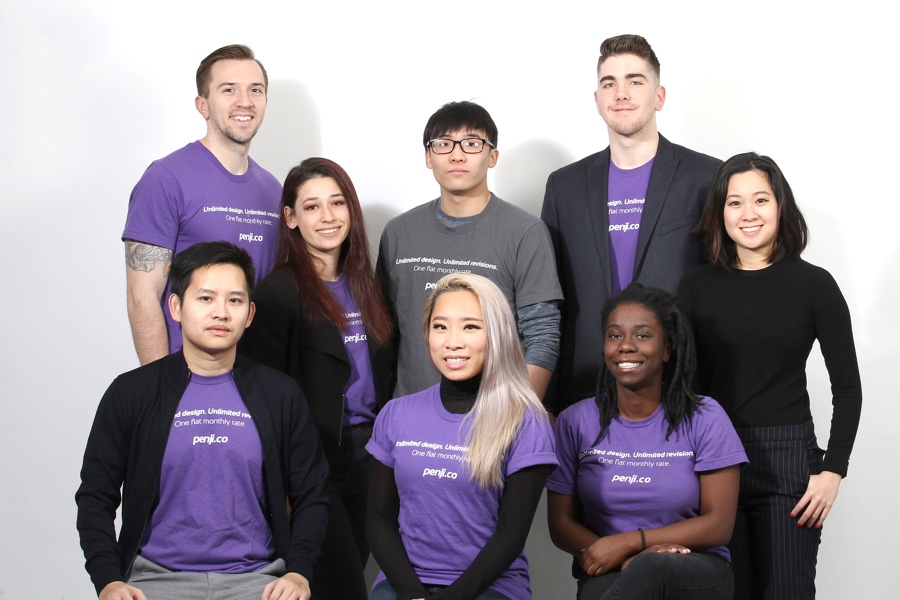
Penji. Top L: Johnathan Grzybowski, Co-Founder; Naciye Cakir, Project Manager; Steven Nguyen, Animation Director; Liam Ely, Lead Designer; Melissa Le, Public Relations and Partnership; Bottom L: Khai Tran, Co-Founder and CEO; Jie Kuang, Marketing Manager, Sekinah Brodie, Marketing Assistant. Photo by Claudia Gavin.
Founded: 2017 by Johnathan Grzybowski and Khai Tran
Team: 23
Funding: Self-funded
Problem: Startups, small businesses, and agencies are spending too much time and money either outsourcing or managing their graphic design needs. And they’re not spending enough time growing their business.
Penji’s Solution: The startup is offering on-demand unlimited graphic design services — logos, pitch deck design, web and app design, and revisions — at a low monthly cost. Customers can sign up on a month-to-month basis, with no long-term contract required. To communicate with clients and better handle requests, the company also built its own web-based software.
By the Numbers: In three months time, Penji grew 10 accounts to 200 with clients all over the United States and international countries including Mexico, Canada, and the United Kingdom.
Community Conscious: The startup’s Camden Unlimited nonprofit incentive program offers unlimited design service to Camden nonprofits for $1 per month. The team is set to hire 100 Camden students by end of 2019.
What’s ahead in 2018: Thus far, Penji has hired five Camden students and looks to scale their startup to bring on more clients, Camden hires, and continuously grow their services.
PhillyWisper
“For the folks who got their cell phones, Netflix, Hulu, HBO Go — and all you want is internet — we make it easy for you.”
–Mark Steckel PhillyWisper founder and CEO

PhillyWisper founder Mark Steckel. Photo by Claudia Gavin.
Founded: 2015 by Mark Steckel and John Falcone
Team: 3
Funding: Self-funded
Problem: Just a handful of big providers dominate the broadband marketplace. The lack of competition leaves consumers with few, if any, options. Resultantly, poor customer service on the part of internet service providers is the norm.
PhillyWisper’s Solution: The startup provides affordable ($50/month) contractless internet service that uses fixed wireless technology. They guarantee upload and download speeds of 25Mbps that can sometimes reach 50Mbps. And most of all, PhillyWisper specializes in building customer relationships. The company practices net neutrality and says it won’t ever sell or share subscribers’ personal information.
Street Cred: Born in Philly and raised in Detroit, co-founder Mark Steckel has been building tech companies for more than 25 years. He started his first company in 1991 and then helped launch an online ad company in 1999. In 2006 he was the ninth employee at the Huffington Post and by 2011 he was at Change.org.
Secret No More: The company has attracted a few hundred customers just by word of mouth. Businesses like Philly CAM and Indy Hall have ditched traditional providers for PhillyWisper. On why they evaded press Steckel says, “We’ve seen many companies sell the hype before they were ready and then never get to market. Or when they do, they so underperform. We had to make sure this works, that we can provide a good reliable service and take care of our customers.”
What’s ahead in 2018: The team wants to expand services to South and West Philadelphia. Gigabit internet service is coming soon.
RoundTrip
“We want to become the single touch point for all types of transportation across the country.” –Mark Switaj, RoundTrip founder and CEO

RoundTrip. Photo by Claudia Gavin.
Founded: 2016 by Mark Switaj
Team: 22
Funding: $2 million raised
Problem: The country’s medical transportation system is out of whack. About 3.6 million Americans miss or delay care each year because of transportation issues.
RoundTrip’s Solution: The team has created a software platform for non-emergency medical transportation. Hospitals, health care organizations and patients can use RoundTrip’s portal to call rides.
Challenge Accepted: RoundTrip will represent Philadelphia at the international 1776 Challenge Cup held in Washington, D.C. this year.
By the Numbers: In 2017, the startup experienced a 40 percent month-to-month growth rate and expanded into seven new states from Massachusetts to Virginia.
What’s ahead in 2018: The startup is on a quest to decrease patient no-shows, a chronic issue for many hospitals and health care organizations. Their model has already worked to decrease the no-show rate at MD Anderson Cooper Cancer Center this year. They’ve amassed a lot of data, which they’ll comb through to begin telling a deeper story about how they impact outcomes.
Tozuda
“This tech will be mandatory for sports protocol. It’s just a matter of when.”
–Jessie Garcia, Tozuda founder and CEO
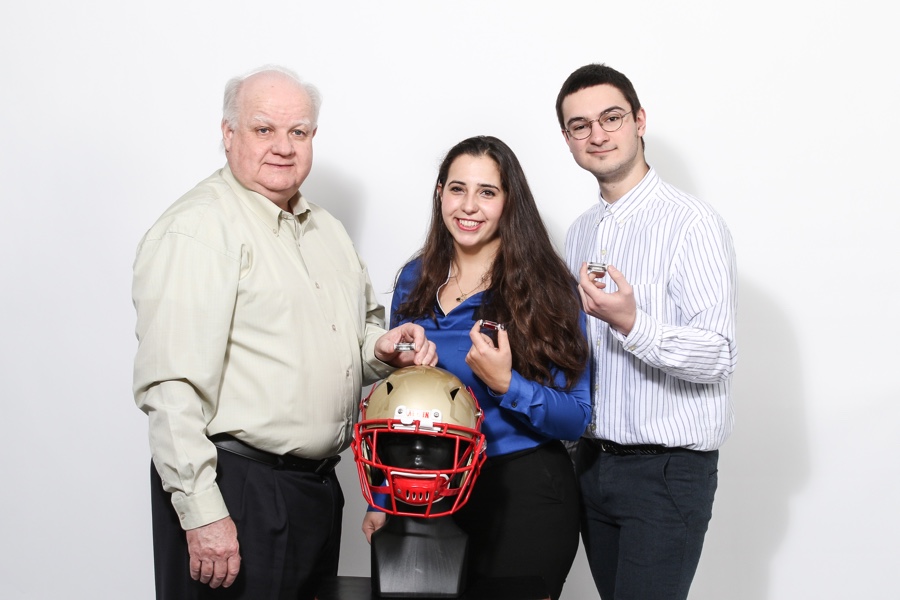
Tozuda. L to R: John Pettit, business development manager; Jessie Garcia, CEO & founder; and Keagan Clark, research engineer. Photo by Claudia Gavin.
Founded: 2013 by Jessie Garcia
Team: 4
Funding: Grants and self-funded
Problem: The CDC says that 153 people in the U.S. die each day from traumatic brain injury, and those who survive such injuries go on to face effects that can last a lifetime. When it comes to sports and construction in particular, there are few accessible tools that can help detect concussions in players and workers early on.
Solution: Tozuda has manufactured an affordable and reliable head impact sensor that indicates potential traumatic brain injury. Users attach the small tube-like device onto their helmets or hardhat, and, in the event of a potentially concussive force, the device turns bright red. The red color signals to users that they should seek medical attention.
It’s personal: Garcia experiences post-concussive symptoms that stem from her college rugby days.
Fun fact: To design the product, the team invested in an injection molding machine, which they now call “Bertha.”
What’s ahead in 2018: Garcia will take part in the Village Capital Pathways program as the company looks forward to selling the product and generating revenue this year. They’ll kick off the spring with a Kickstarter campaign and continue product development partnerships with Pennoni Construction and New Jersey’s Bergen Catholic football team.
VitalTrax
“This is a huge market, with $170 billion a year being spent on clinical research worldwide. We think we’re onto the right consumer-oriented approach to patient recruitment.”
–Zikria Syed, VitalTrax co-founder and CEO
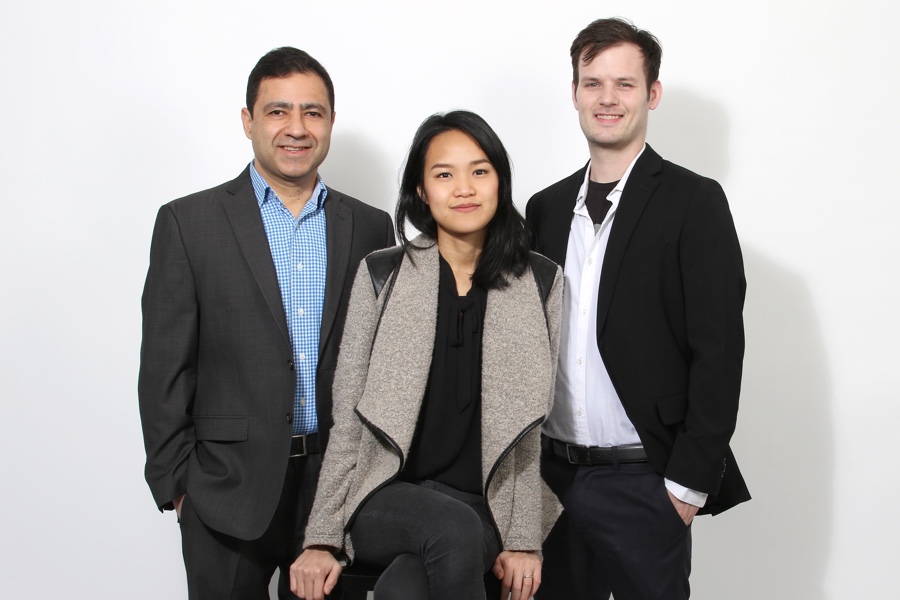
VitalTrax. L to R: Zikria Syed, co-founder and CEO; Penn Kueny, Director Product Management; Todd Kueny, co-founder and CTO. Photo by Claudia Gavin.
Founded: 2016 by Zikria Syed and Todd Kueny
Team: 8
Funding: Over $800K raised
Problem: The number one cause of a failed clinical trial is a lack of participants.
There are more than 50,000 clinical trials running in the U.S. at any given time and companies now need an estimated 100 million people to fill them. But patients struggle to enlist in trials because of outdated enrollment protocols.
VitalTrax’s Solution: Through PatientWing, a cloud-based web application that’s been likened to OpenTable, the startup makes it easier for patients to find and participate in clinical trials. Patients can search tens of thousands of trials and enroll in them online. The platform provides status updates to keep enrollees informed. For pharmaceutical companies and research sites, Patient Wing creates a platform for them to engage with patients.
Track Record: VitalTrax is the third startup Syed has founded. His previous startup NextDocs raised more than $25 million from investors.
#1: VitalTrax was the first company to score investment from the region’s digital health fund run by Ben Franklin Technology Partners, IBX and Safeguard Scientifics.
What’s ahead in 2018: This year is all about scale. The team plans to add more members and invest in sales and marketing.


